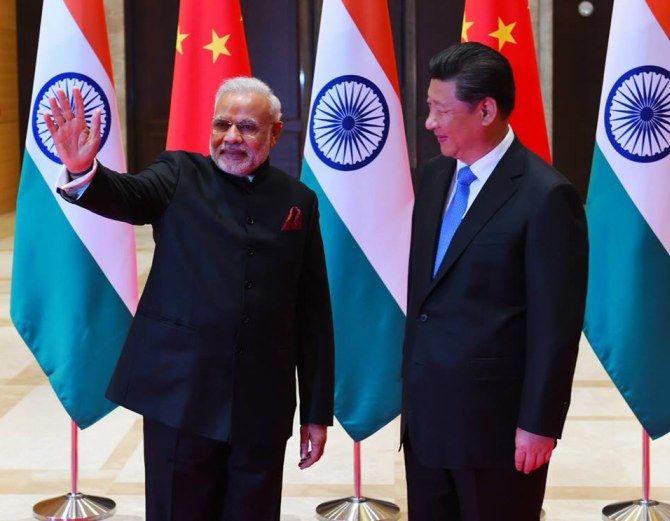
There is enough scope for India and China to cooperate on nuclear energy issues despite the lingering issues which not only includes the Sino-Pakistan nexus, but also the Sino-India border dispute over the LAC, says Debalina Ghoshal.
Prime Minister Narendra Modi’s visit to China in May became a cynosure for the world order as there was much hullabaloo over the visit. The visit attracted both praise and criticism. Modi has stressed on various aspects of cooperation in which nuclear cooperation remained an integral aspect.
However, the seeds of this nuclear cooperation was already sowed in September 2014. This was during China’s President Xi Jinping’s visit to India when Modi and Xi held discussions on civil nuclear cooperation between each other.
Modi then viewed this cooperation to be a step to “bolster broader cooperation on energy security” between New Delhi and Beijing. Expansion of civil nuclear energy has been viewed by both India and China as “essential component of their national energy plans to ensure energy security.” This is more so true as both China and India are seeking for clean energy.
This turn of events in 2014 took place amid the Sino-Pakistan nuclear and defence ties and also amid the India-China border dispute over the Line of Actual Control. Diversity in the nuclear energy field has been an important factor for India’s nuclear industry and China figures as viable option for India to explore. For China, India offers a big nuclear market and with the Nuclear Suppliers Group waiver on India, investing in India’s nuclear energy market could prove financially lucrative for China.
Chin-India nuclear cooperation is not new. On a broader framework cooperation between the two countries already exists with the International Thermonuclear Experimental Reactor project, which draws Asian countries like China, India, South Korea along with the Western countries US, Russia and the European Union countries which aims to increase efficiency of nuclear energy by the process of fusion reaction.
Beijing could provide nuclear reactors to India as a part of the nuclear cooperation process. But, it is yet, unclear if there is a political willingness in Beijing to provide nuclear reactors to India. That said, there still are scopes for India to cooperate with China in myriad areas as regards to civil nuclear technology. Both Beijing and New Delhi lay stress on nuclear waste management, nuclear non-proliferation efforts and nuclear safety and security measures and these are areas of cooperation, which both New Delhi and Beijing could consider cooperating upon bilaterally.
In addition to this, China is working on nuclear fission-fusion hybrid nuclear reactor technology, considered to be a state-of-art technology in nuclear science. India could cooperate with China on this aspect for ensuring increased efficiency of nuclear energy. This would strengthen waste management and nuclear non-proliferation efforts.
Even though the ITER project is going on, the project is already saddled with delays due to the Fukushima incident and construction delays. Fusion-Fission hybrid technology can be a step towards achieving green energy, especially crucial as both Modi and Xi vouch for clean energy.
Beijing has also showed a keen interest in developing thorium reactors for cleaner energy, which are less prone to being used to develop nuclear weapons. China and India could both indulge in technological cooperation to develop thorium-based reactors and cooperate towards the required research and development. India is working on thorium-fuelled nuclear reactors that can, as evident from advanced heavy water reactors, reduce any scope for nuclear proliferation or development of nuclear weapons.
China, on the other hand, aims to master the technology of developing molten salt reactor technology using thorium fuel and cooperation in this field could be vital for both the states especially India has also showed keen interest in developing such reactors. These are suggested areas that could be considered worth cooperating on.
New Delhi also aspires to join the NSG, and China’s support for this is vital as evident from Modi’s speech at the Tsinghua University, where he stated that this support would strengthen international cooperation. Enhanced nuclear cooperation could be a step towards achieving this support. In February 2015, China also supported India’s permanent membership into the UNSC and therefore, the Chinese support for NSG is not next to impossible.
Future Challenges
Sino-Indian nuclear cooperation should not be saddled with the concerns of China-Pakistan nuclear ties. Providing nuclear reactors to Pakistan by China though remains a concern since it only provides Islamabad to enhance its fissile materials. These concerns should not let the prospects of nuclear cooperation between India and China get doomed.
Beijing also shares nuclear cooperation with the US which continues despite China’s irritation over the US ballistic missile defence in East Asia, China’s discontent over the Taiwan issue, and China’s Anti-Satellite tests, not viewed by the US in positive light and also despite disagreements on arms control issues like the Prevention of an Arms Race in Outer Space and US discontent over China’s non adherence to the Missile Technology Control Regime.
Thus, there is enough scope for India and China to cooperate on nuclear energy issues despite the lingering issues which not only includes the Sino-Pakistan nexus, but also the Sino-India border dispute over the LAC.
Image: Modi with Xi Jinping during his recent visit to China
Debalina Ghoshal is research associate, Delhi Policy Group.










